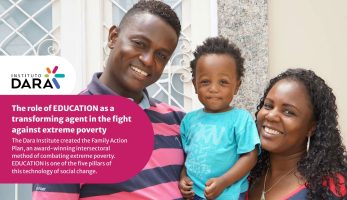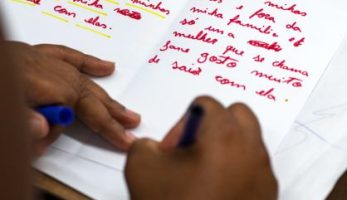Prioritizing Early Childhood
Investing in early childhood is an investment in a better future. To achieve this, it’s crucial for public, private, and social institutions to adopt concrete measures to protect and promote child development.
Numerous studies indicate that investing in the initial phase of human development (0 to 6 years), during which time a significant portion of a child’s brain architecture is formed, is a multidimensional process that can positively or negatively impact a country’s future in various aspects, including economics, health, education, and social protection. Interventions and investments in children’s physical, cognitive, linguistic, and socio-emotional development have the potential to counteract negative trends and yield better outcomes in terms of education access, learning quality, physical growth, health, and, consequently, across all social dimensions. Failure to develop these skills can lead to long-term and often irreversible effects, resulting in significant costs for both families and the state going forward.
Human Development Indicators
The association between poverty and multiple areas of child development highlights the need for strategic interventions to prevent the perpetuation of inequality, which could become a lasting obstacle to a nation’s development. Well-prepared individuals are more likely to overcome poverty, and this, in turn, impacts a country’s indicators of human and economic development. Investments in improving physical and mental health reduce reliance on the healthcare system and the potential for engaging in high-risk behaviors, including criminal and violent activities (Lynch, 2005).
Impact on Education
In the realm of education, children who do not benefit from quality interventions are more prone to repeating school years, dropping out, and registering poor academic performance/grades. These factors impose a high cost on society as a whole. Families must support their children for longer as dependents, public resources are used in an inefficient education system, and, of particular note, children and adolescents who experience difficulties in their school life may lose, at least to some extent, their interest in learning. Well-targeted interventions in early childhood represent an economic strategy to promote access, retention, and completion of studies at the expected age while also influencing the ability to form positive relationships, express emotions, show empathy, curiosity, persistence, and socially engage using language.
Public Policies for Early Childhood
In Brazil, despite significant economic and social inequality, there is a wide range of public policies, programs, and projects focused on issues related to early childhood. These include the Unified Social Assistance System (SUAS), the Unified Health System (SUS), the National Plan for Early Childhood, the National Policy for Comprehensive Child Health Care, and the National Education Plan, with its first goal aimed at providing services for children aged 0 to 3 (daycare) and 4 to 5 years (early childhood education). One of the challenges in the intersectoral organization of policies for early childhood, to ensure comprehensive care and the establishment of a social protection network, is the coordination between social organizations and the national, state, and municipal levels.
In Brazil, 32 million children and adolescents live in poverty.
In 2023, UNICEF published the report “The Multiple Dimensions of Poverty in Childhood and Adolescence in Brazil,” presenting data from a study on how worsening food insecurity and extreme poverty affect Brazilian children and adolescents. The study analyzed eight indicators that make up the multidimensionality of poverty, including access to rights, sanitation, housing, nutrition, education, income, information, and protection against child labor. It showed that poverty extends beyond monetary conditions. The study not only revealed that more than 60% of the population up to 17 years old lives in poverty in Brazil but also aimed to contribute to understanding, diagnosing, and addressing the challenges to ensure the basic rights of children and adolescents, as outlined in the Brazilian Constitution, the Child and Adolescent Statute, and the Sustainable Development Goals (SDGs). You can access the complete report on the UNICEF website.
The impacts of inequality on early childhood
The current scenario in relation to food insecurity
2.3 million Brazilian children between 0-6 currently live in households that do not have sufficient income to provide the necessary basic food items
This represents the equivalent of 10% of Brazilian children in this age bracket, or 1 in 10
The existing scenario (based on 2022 date)
The percentage of Brazilian households living in conditions of food insecurity
The proportion of Brazilian households with insufficient access to basic food items and often facing hunger
The proportion of families with children under 10 suffering from hunger
Source: Núcleo Ciência pela Infância, based on data from the National Survey on Food Insecurity in the Context of the Covid-19 Pandemic in Brazil, released by the Brazilian Network for Research on Food Sovereignty and Food and Nutrition Security (Rede PENSSA, 2022).
Another publication that helps understand the situation is Comitê Científico do Núcleo Ciência pela Infância e Fundação Maria Cecilia Souto Vidigal (2022) (Impacts of inequality in early childhood) by the Scientific Committee of Núcleo Ciência pela Infância and Maria Cecilia Souto Vidigal Foundation (2022). The document shows how the country’s socio-economic, educational, and health inequalities affect the full development of millions of children in Brazil with effects that can last for generations. Another topic addressed is the importance of investing in intersectoral actions and policies (involving various areas of the government), such as basic sanitation, housing with infrastructure, and clean water, to ensure good living conditions for children. This study addresses the development of relevant socioeconomic, educational, and health indicators in the context of early childhood in Brazil, highlighting the increase in regional, racial, and social inequalities in recent years. The text also points out necessary advances in public policies to promote equity in early childhood. It analyzes the main factors of educational inequality between 2011 and 2021 and recommends some public policies that can be effective in changing this scenario. It also examines maternal and child health indicators, their negative effects on children aged 0 to 6 years, and possible actions to reduce inequalities. When a child does not achieve its full development, it loses on average, 20% of individual income in adult life.
Early Childhood at the Dara Institute
The Dara Institute has been working for over 30 years in promoting health, human development, and poverty alleviation, applying the pioneering technology of the Family Action Plan (PAF) Plano de Ação Familiar (PAF), which implements a systemic approach with the families served in the areas of health, education, housing, citizenship, and income.
The care provided to families has always had the child’s health as the main focus, especially their physical and mental health. Starting in 2022, with the support of the Care about Children Foundation and based on the demands arising from the mental health scenario during the Covid-19 pandemic, the Dara team has been working on a Psychopedagogical Recreation project for children Recreação Psicopedagógica para Crianças, offering individual and group activities. Of the 226 children served since 2022, the five main mental health issues identified were: anxiety/depression in 25.7% of children, 25.7% with autism/suspected Autism Spectrum Disorder (ASD), 14.3% with aggression, 11.4% with signs of self-harm, and 11.4% experiencing withdrawal, while 11.4% of children were exposed to domestic violence.
Additionally, a partnership between the Dara Institute and The Basics Learning Network Instituto Dara e o The Basics Learning Network aimed at applying five basic principles in the early childhood development of families served by the organization. These principles include stress control, speaking, singing, pointing, counting, grouping, comparing, reading, storytelling, encouraging movement, and play. These principles are easy to replicate at home and contribute a great deal to children’s development, considering the realities in which the families served live.
“During the pandemic, as part of a project at the time, we worked on these basic principles with families, and it was very important because everyone was in isolation, without daycare or schools operating in person. It was a way for caregivers to assist in the children’s development, even at home. They exchanged and shared resources and tools they had and used at that time.” – Fabiana Pádua, Coordinator of Psychology at the Dara Institute.
The experience of Dara Institute can contribute to the development of public policies focused on early childhood
An example of the expansion of knowledge derived from Dara’s experience in early childhood is the partnership with the Municipality of Itu and the Tecendo Infâncias Institute. In late 2021, Dara was invited to participate in the Intersectoral Committee for Early Childhood at Itu, a group comprised of representatives from various Municipal Secretariats, the Tecendo Infâncias Institute, and several experts and representatives from civil society. This committee was responsible for developing the Municipal Plan for Early Childhood in Itu (PMPI-Itu), a long-term intersectoral planning instrument aimed at establishing guidelines, goals, and strategies for expanding, improving, and implementing public policies for pregnant women, children aged 0 to 6, and their families, particularly those in situations of vulnerability. In November 2022, the PMPI-Itu was approved by the City Council and became Municipal Law.
In November 2022, Dara signed a contract with the Tecendo Infâncias Institute to provide training for professionals from different municipal secretariats in the methodology of the Family Action Plan (PAF). In January 2023, the project embarked on a territorial study, followed by several training sessions on the underlying methodology used at the Institute. In April, the municipal team went on an immersion course at Dara, which culminated in two days of co-creation to customize the PAF for Itu. The next phase of the project involves jointly creating the guidelines for implementing the PAF in Itu with the technical teams from the municipal secretariats and the Tecendo Infâncias Institute.
The Dara Institute is also part of the National Childhood for Early Network (RNPI), alongside 240 other organizations throughout Brazil. The RNPI is a group of national civil society organizations, the government, the private sector, other networks and multilateral entities that work, directly or indirectly, to promote and defend the rights of early childhood.




